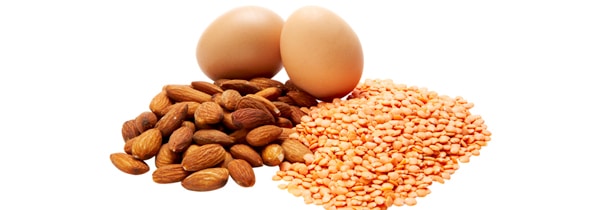
10 Oct Vegetarian Protein: There Is More Than Just Meat
Vegetarian Protein
When you hear the word protein it is usually associated with meat, but in reality it is contained in many foods including vegetarian sources.
Whether you are considering a vegetarian diet or would like some meat-free protein options sourcing protein from vegetarian sources is very easy to do.
One of the main considerations when looking at vegetarian proteins especially if no meat options are being consumed is to have variety to ensure all nutritional needs are met.
When you break a protein down what you are left with is amino acids. There are 20 of these in a complete protein. 11 of these can be made in the body but only 9 can only be obtained by diet.
An example of a complete vegetarian protein is eggs but others such as beans, wheat and rice are lacking certain amino acids. This can be remedied by mixing 2 protein sources such as beans and rice.
It is not necessary to mix your proteins at every meal if your diet is quite varied through out the day and contains different vegetarian protein types but it may be a good idea to begin with until it is understood which proteins are high in which amino acids.
See below for different protein sources. Remember protein is found in many foods including fruit and vegetables but below is some of the food groups containing higher amounts. (Protein content may vary with brand and different processing methods, check individual labels for protein content). Below this is different options for vegetarian essential amino acids.
Protein source (Amount, protein(g))
- Tempeh (1 cup 31g)
- Soybeans, cooked (1 cup 29g )
- Medium sized egg (6g)
- Milk (250ml 8g)
- Fetta cheese (75g 10g)
- Chedder cheese (1/2 cup 15g)
- Lentils, cooked (1 cup 18 g)
- Black beans, cooked (1 cup 15g)
- Kidney beans, cooked (1 cup 15g)
- Chickpeas, cooked (1 cup 15g)
- Pinto beans, cooked (1 cup 15g)
- Lima beans, cooked (1 cup 15g)
- Black-eyed peas, cooked (1 cup 13g)
- Veggie burger (1 patty 13g)
- Baked beans (1 cup 12g)
- Tofu, firm (100g 11g)
- Tofu, regular (100g 10g)
- Quinoa, cooked (1 cup 8g)
- Peas, cooked (1 cup 8g)
- Textured Vegetable Protein (TVP), cooked (1/2 cup 8g)
- Peanut butter (2 Tbsp 8g)
- Veggie sausage (1x 8 g)
- Pasta, cooked 1 cup (8 g)
- Almonds (1/4 cup 8g)
- Soy milk, commercial, plain (250ml 8g)
- Rice milk (250ml 2g)
- Almond Milk (250ml 2g)
- Brown rice protein (25g serve 20g)
- Spirulina (1tbsp 4g)
- Whole wheat bread (2 slices 7g)
- Almond butter (2 Tbsp 7g)
- Soy yogurt, plain (230ml 6g)
- Bulgur, cooked (1 cup 6g)
- Quinoa (1 cup 8g)
- Sunflower seeds (1/4 cup 6g)
- Cashews (1/4 cup 5g)
- Spinach, cooked (1 cup 5g)
- Broccoli, cooked (1 cup 4g)
The essential amino acids are: phenylalanine, valine, threonine, tryptophan, methionine, leucine, isoleucine, lysine and histidine.
Phenylalanine: spirulina, soy, legumes, cheese, nuts and seeds
Valine: rice, legumes, eggs, nuts, cottage cheese, pumpkin seeds, sesame seeds
Threonine: nuts and seeds, whey protein, soy protein, spirulina, legumes
Tryptophan: eggs, nuts and seeds, cheese, spirulina, soy protein
Methionine: soy protein, spirulina, nuts and seeds, cheese
Leucine: soy bean, lima bean, spirulina, kidney beans, spinach, cheese, eggs
Isoleucine: pumpkin seeds, cheese, nuts, legumes, peanuts
Lysine: eggs, cheese, lentils, soy, almonds
Histidine: dairy, rice, wheat, rye, beans, eggs, buckwheat, corn, cauliflower, mushrooms, potatoes, citrus fruit
